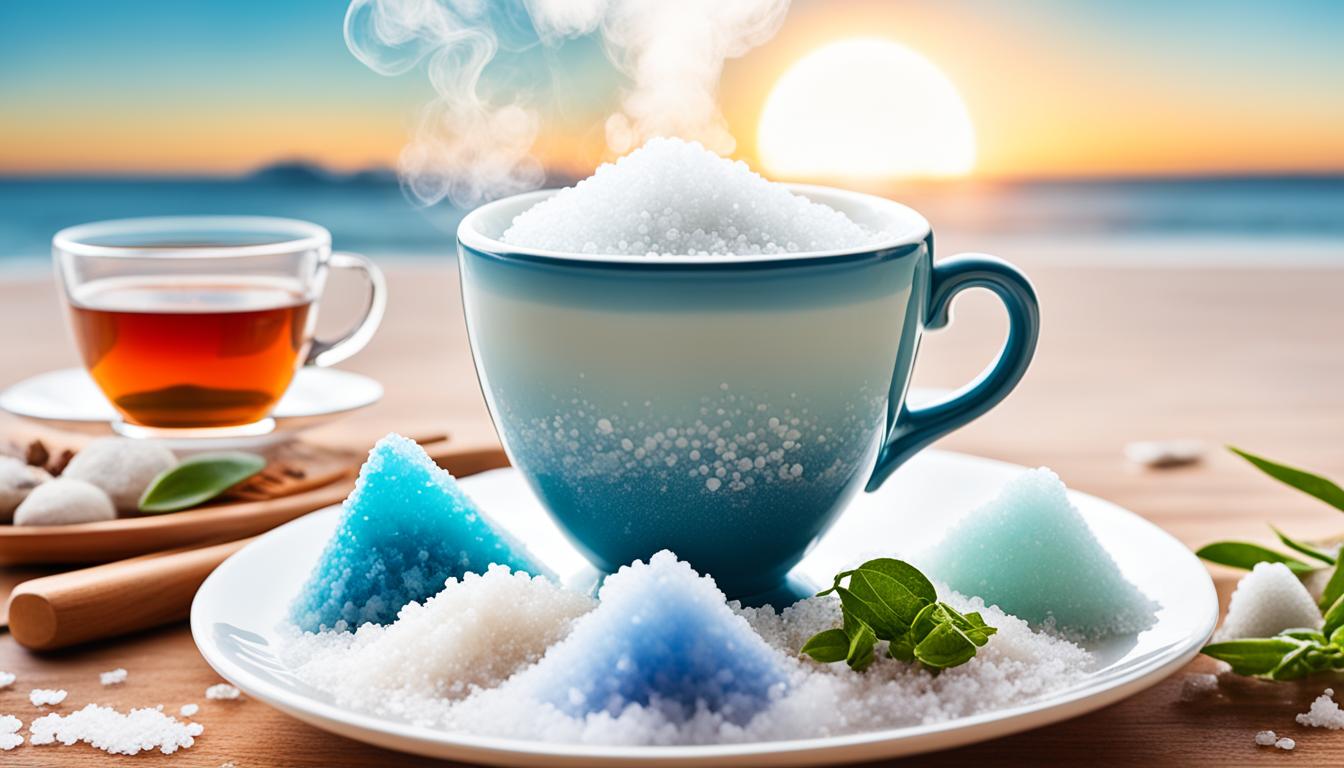When it comes to tea, we often think of soothing flavors and warm relaxation. But have you ever considered adding salt to your tea? Yes, salt! It may sound peculiar, but this simple ingredient can transform your tea-drinking experience in surprising ways.
But why would anyone want to add salt to their tea? And what are the benefits of doing so? In this article, we will explore the intriguing practice of adding salt to tea and uncover the unique flavors it brings to the table. Get ready to dive into the world of salted tea and discover a whole new level of tea enjoyment.
Key Takeaways:
- Adding a pinch of salt to tea can enhance its flavor and reduce bitterness.
- The science behind adding salt to tea lies in how it interacts with our taste receptors.
- Salted tea has historical and cultural significance in various regions, including Tibet and Kashmir.
- There is controversy surrounding the practice of adding salt to tea, with traditional tea drinkers divided on the matter.
- The quality of tea leaves and brewing techniques play a crucial role in creating delicious salted tea.
The Science Behind Adding Salt to Tea
The suggestion to add salt to tea is based on the science of taste and flavor. Salt enhances the flavor of food and can also mitigate bitterness. When we eat salt, the positively charged sodium ions and negatively charged chloride ions interact with our taste receptors, dampening the perception of bitterness. This principle applies to tea as well, making it less bitter when salt is added. However, it is important to add just a pinch of salt to tea to avoid it becoming too salty and overpowering the other flavors.
Adding salt to tea is not a new concept and has been practiced in different cultures, such as Tibet and Kashmir, where salted teas are popular. By understanding the science behind taste and flavor, we can appreciate how salt can enhance the overall tea experience. Experimenting with different ingredients, including salt, can lead to unique tea recipes that cater to individual preferences.
“Sodium ions in salt interact with our taste receptors, reducing the bitterness in tea and making it more enjoyable.” – Michelle Francl
The Benefits of Adding Salt to Tea
When salt is added to tea, it not only reduces bitterness but also enhances the overall flavor profile. The sodium ions in salt interact with taste receptors on our tongues, dampening the perception of bitterness. This makes the tea smoother and allows other flavors to shine through. Additionally, adding a pinch of salt can balance out any excessive sweetness in some teas, creating a more harmonious taste.
Here is a simple recipe to try:
- Boil water and prepare your favorite tea leaves or tea bags.
- Add a pinch of salt to the boiling water before steeping the tea.
- Let the tea steep for the recommended time, allowing the flavors to blend.
- Enjoy your salted tea, adjusting the salt quantity to suit your taste.
Remember to start with a small amount of salt and gradually increase it to find the perfect balance that complements the natural flavors of the tea. It’s all about personal preference and experimenting with different ingredients to create your own unique tea recipes.
| Benefits of Adding Salt to Tea | Explanation |
|---|---|
| Enhances flavor | Salt can bring out the natural flavors of tea and make it more enjoyable. |
| Reduces bitterness | The sodium ions in salt interact with taste receptors, making tea less bitter. |
| Creates balance | Salt can balance out excessive sweetness and add depth to the overall taste. |
| Allows experimentation | Adding salt to tea opens doors to creating unique and personalized tea recipes. |
Historical and Cultural Perspectives on Salted Tea
While the concept of adding salt to tea may be new to some, it has a long history in certain cultures. Chinese tea master Lu Yu, who wrote the Classic of Tea in the 8th century, recommended adding a pinch of salt when boiling water to make tea. Tibetan and Nepalese cultures also have a tradition of making salted teas like butter tea. In Kashmir, salt tea is a popular beverage that involves brewing green tea leaves with baking soda and then adding salt and milk.
These salted teas are believed to have various health benefits and are enjoyed by many.
| Tea Culture | Salted Tea Tradition |
|---|---|
| China | Adding salt while boiling water |
| Tibet and Nepal | Making butter tea with salted ingredients |
| Kashmir | Brewing green tea with salt, baking soda, and milk |
| Health Benefits | Enjoyment |
|---|---|
| Believed to have various health benefits | Enjoyed by many for its unique flavor |
Salted teas like these have become an integral part of their respective cultures and are appreciated for their distinctive taste profiles.
How to Make Salt Tea
Interested in trying salted tea? Here’s a simple recipe to get you started:
- Boil water and add your preferred tea leaves or tea bags.
- Add a pinch of salt while the water is boiling.
- Let the tea steep for the desired amount of time.
- Strain the tea and enjoy it hot or cold.
Feel free to experiment with different types of tea, salt amounts, and additional ingredients to create your own personalized salted tea recipe. Remember to start with high-quality tea leaves and adjust the salt according to your taste preferences. Cheers to a unique and flavorful tea experience!
The Controversy Surrounding Salted Tea
The suggestion to add salt to tea has sparked controversy, particularly among traditional tea drinkers. Some argue that tea should be enjoyed in its pure form, without any additional ingredients. However, proponents of salted tea believe that it offers several benefits, including enhancing the flavor and making a bitter cup of tea more enjoyable.
Adding salt to tea allows for experimentation with different flavors, opening up a world of unique and personalized tea recipes. It can add depth and complexity to the taste, bringing out the natural flavors of the tea leaves. Instead of overpowering the tea, the right amount of salt can balance and complement its flavors.
The addition of salt to tea has the potential to transform the drinking experience, creating a beverage that is both satisfying and intriguing. By exploring the world of salted tea, tea enthusiasts can discover new dimensions of flavor and unlock endless possibilities in their tea brewing journey.
While traditionalists may dismiss the idea of tea flavoring with salt, it is important to remember that taste is subjective. What one person may find delightful, another may find off-putting. The controversy surrounding salted tea emphasizes the diverse preferences and personalization that exist within the world of tea.
Ultimately, the decision to add salt to tea is a matter of personal choice and experimentation. For those curious about exploring new and unique flavor profiles, salted tea can offer an exciting adventure. It is an opportunity to break away from tradition and create a tea experience that is truly one’s own.

The Role of Quality Tea and Brewing Techniques
When it comes to flavoring tea with salt, the quality of the tea leaves and the brewing techniques play a crucial role. Starting with high-quality tea leaves is essential for achieving a delightful salted tea experience. Poor-quality tea leaves can be inherently bitter, and adding salt may not completely mask the bitterness.
Moreover, the brewing process also impacts the flavor of the tea. The temperature of the water and the steeping time can greatly influence the taste. Brewing tea at the right temperature and allowing it to steep for the appropriate duration helps bring out the best flavors, allowing the salt to complement the natural qualities of the tea.
Experimentation is key to finding the perfect balance between tea flavoring with salt. It’s important to add just the right amount to enhance the flavor without overpowering it. Whether you prefer a subtle hint or a bolder taste, finding the right balance will result in a delicious salted tea that suits your preferences.
Conclusion
The suggestion to add salt to tea has sparked debate and curiosity among tea enthusiasts. While it may not be for everyone, adding a pinch of salt can enhance the flavor of tea and make it more enjoyable, especially for those who find tea too bitter.
Exploring the historical and cultural perspectives on salted tea reveals the richness and diversity of tea traditions worldwide. From Chinese tea master Lu Yu’s recommendation to Tibetan and Nepalese traditions of making butter tea, salted tea recipes have stood the test of time.
Experimenting with different ingredients, including salt, opens the doors to creating unique and personalized tea recipes. From floral flavors to the depth of umami, there are endless possibilities to discover. The decision to add salt to tea ultimately rests in the hands of each individual, guided by personal preference and taste.
